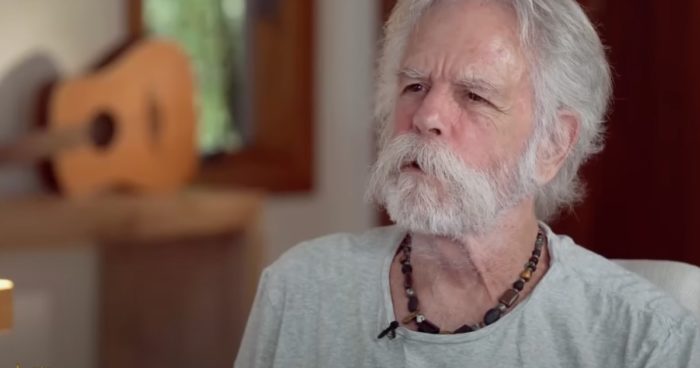This morning the Grateful Dead’s Bob Weir joined CBS’ John Blackstone for an extended interview on CBS Sunday Morning. During the nearly 18-minute interview, the two discussed everything about Grateful Dead, from his ongoing efforts to honor the life and legacy of Jerry Garcia and adapting the Grateful Dead’s discography for performances with symphony orchestras to his commendable work ethic at age 75.
To start the conversation, Weir spoke about his approach to songwriting and its reoccurring siren song.
“You know, every now and again, something wakes me up in the middle of the night and says, ‘No, you gotta get up. Nope, nope. You’re not going back to bed. You’re getting up,” Weir said. “Yep. You’re gonna have to sit down with the guitar. It’s part of the gig.” He went on to say “The blank page is the greatest challenge life has to offer. What’s worth saying anymore? Especially in an era where it is just wall-to-wall universal output, and everybody’s saying something. When you’re writing a song, you’re writing something that can’t be said with words alone. Can’t be done with music alone. It takes words and music. Maybe offer a new insight into something that’s otherwise been said a million times. Those new insights are, you know, they’re hard. They’re hard to find. They’re hard to come by.”
Blackstone then inquired about a common theme in Weir’s songwriting: life in a band –mentioning tracks like “Uncle John’s Band,” The Other One,” “Playing In The Band,” and more. Weir shared, “If I’m gonna speak from experience, I’m probably going to have to couch it in terms of the fact that all I’ve ever known is this existence. I’ve been a performing musician all my days. People are given—even me from time to time—given to the notion that I’m speaking from my own experience when really, in reality, I’m speaking from some sort of mythical place.”
They then moved to the topic of Garcia’s passing and legacy: “Well, he left some unfinished business, and I’m gonna do my best. We were partners. I’m gonna do my best to tidy some stuff up for him. He was a dear friend of mine. You know, that’s what you do for your friends.” He went on to share about an ethereal experience, “Jerry came to me in a dream. He does this from time to time, and he wanted to introduce to me a song,” Weir added. “It was a jazz ballad; I think that we were going to sing a duet on. And he invited the song into the room, and in the dream, it was like an enormous, ethereal kind of English sheepdog that came in. And it sniffed me. And, you know, I batted around a little bit and we [went] back and forth a little bit. And we immediately established a little rapport there, and then we settled in, and we started singing it.”
The rich interview then shifted to some more recent endeavors by Weir, specifically performing Grateful Dead songs with symphony orchestras: Weir performed the National Symphony Orchestra in Washington D.C. last month and has plans to perform with the Atlanta Symphony in February of 2023.
“Bach made something of a career of dressing up gypsy fiddle tunes. And our music more or less comes from folk roots. But we halfway dressed it up and made it, I guess, what you’d call popular music. But that extra step to put [it] into the classical realm, it illustrates to me that there’s a continuum from folk music all the way through the most formal classical music.”
When Blackstone asked Weir about his approach to orchestral arrangements in relation to his not being able to read sheet music like classically trained symphony musicians, Weir shared, “I put some work into this. I have to because I’m dyslexic in the extreme, and I’m not gonna read music,” he added “I can write about as fast as I can read. I have to commit all this to memory and then decide what I’m gonna do about this section, that section, whatever. I’m still working on it. We’ve got a couple weeks before the downbeat on the first show. So I’m getting there.”
From there, the two continued to talk about Weir’s journey, the road, and his love of life and music, unearthing many insightful and memorable quotes. To conclude the interview, they explored Weir’s views on the future of the Grateful Dead’s legacy.
“My major consideration these days for what I do with the decisions I make, how I approach this or that is not what ripples it’s gonna make. Right now, my major consideration is what are people gonna say about that or about what I’m thinking or doing in 300 years. Because it occurs to me that if we do all this stuff right, they will still be talking about it in 300 years. That’s just something I think I’ll be able to offer, and all the folks who’ve been working with me will be able to offer to future generations.”
Watch the full extended interview below.



No Comments comments associated with this post